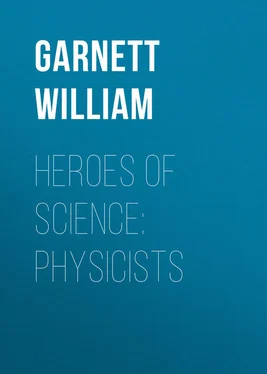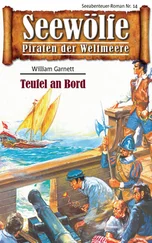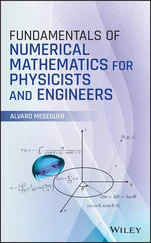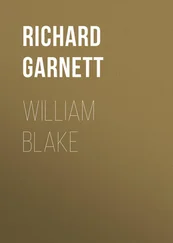William Garnett - Heroes of Science - Physicists
Здесь есть возможность читать онлайн «William Garnett - Heroes of Science - Physicists» — ознакомительный отрывок электронной книги совершенно бесплатно, а после прочтения отрывка купить полную версию. В некоторых случаях можно слушать аудио, скачать через торрент в формате fb2 и присутствует краткое содержание. Жанр: foreign_antique, foreign_prose, на английском языке. Описание произведения, (предисловие) а так же отзывы посетителей доступны на портале библиотеки ЛибКат.
- Название:Heroes of Science: Physicists
- Автор:
- Жанр:
- Год:неизвестен
- ISBN:нет данных
- Рейтинг книги:5 / 5. Голосов: 1
-
Избранное:Добавить в избранное
- Отзывы:
-
Ваша оценка:
- 100
- 1
- 2
- 3
- 4
- 5
Heroes of Science: Physicists: краткое содержание, описание и аннотация
Предлагаем к чтению аннотацию, описание, краткое содержание или предисловие (зависит от того, что написал сам автор книги «Heroes of Science: Physicists»). Если вы не нашли необходимую информацию о книге — напишите в комментариях, мы постараемся отыскать её.
Heroes of Science: Physicists — читать онлайн ознакомительный отрывок
Ниже представлен текст книги, разбитый по страницам. Система сохранения места последней прочитанной страницы, позволяет с удобством читать онлайн бесплатно книгу «Heroes of Science: Physicists», без необходимости каждый раз заново искать на чём Вы остановились. Поставьте закладку, и сможете в любой момент перейти на страницу, на которой закончили чтение.
Интервал:
Закладка:
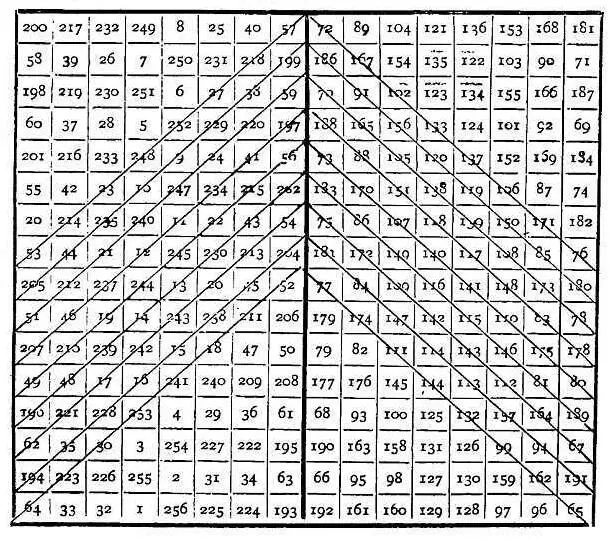
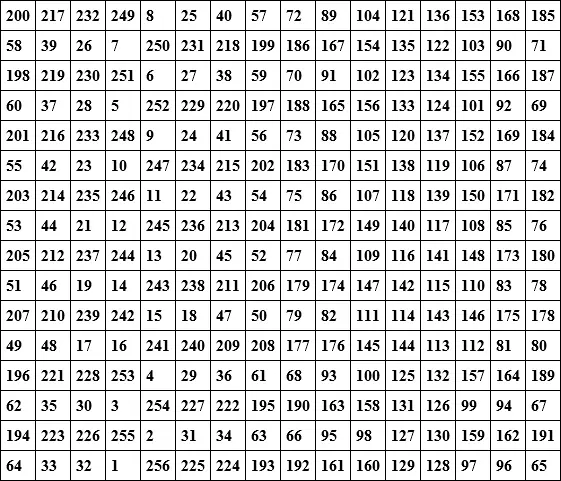
In 1754 war with France appeared to be again imminent, and a Congress of Commissioners from the several colonies was arranged for. Of course, Franklin was one of the representatives of Pennsylvania, and was also one of the members who independently drew up a plan for the union of all the colonies under one government, for defensive and other general purposes, and his was the plan finally approved by Congress for the union, though it was not accepted by the Assemblies or by the English Government, being regarded by the former as having too much of the prerogative in it, by the latter as being too democratic . Franklin wrote respecting this scheme: "The different and contrary reasons of dislike to my plan makes me suspect that it was really the true medium; and I am still of opinion that it would have been happy for both sides of the water if it had been adopted. The colonies, so united, would have been sufficiently strong to have defended themselves; there would then have been no need of troops from England; of course, the subsequent pretence for taxing America, and the bloody contest it occasioned, would have been avoided."
With this war against France began the struggle of the Assemblies and the proprietaries on the question of taxing the estates of the latter. The governors received strict instructions to approve no bills for the raising of money for the purposes of defence, unless the estates of the proprietaries were specially exempted from the tax. The Assembly of Pennsylvania resolved to contribute £10,000 to assist the Government of Massachusetts Bay in an attack upon Crown Point, but the governor refused his assent to the bill for raising the money. At this juncture Franklin proposed a scheme by which the money could be raised without the consent of the governor. His plan was successful, and the difficulty was surmounted for the time, but was destined to recur again and again during the progress of the war.
The British Government, not approving of the scheme of union, whereby the colonies might have defended themselves, sent General Braddock to Virginia, with two regiments of regular troops. On their arrival they found it impossible to obtain waggons for the conveyance of their baggage, and the general commissioned Franklin to provide them in Pennsylvania. By giving his private bond for their safety, Franklin succeeded in engaging one hundred and fifty four-horse waggons, and two hundred and fifty-nine pack-horses. His modest warnings against Indian ambuscades were disregarded by the general, the little army was cut to pieces, and the remainder took to flight, sacrificing the whole of their baggage and stores. Franklin was never fully recouped by the British Government for the payments he had to make on account of provisions which the general had instructed him to procure for the use of the army.
After this, Franklin appeared for some time in a purely military capacity, having yielded to the governor's persuasions to undertake the defence of the north-western frontier, to raise troops, and to build a line of forts. After building and manning three wooden forts, he was recalled by the Assembly, whose relations with the governor had become more and more strained. At length the Assembly determined to send Franklin to England, to present a petition to the king respecting the conduct of the proprietaries, viz. Richard and Thomas Penn, the successors of William Penn. A bill had been framed by the House to provide £60,000 for the king's use in the defence of the province. This the governor refused to pass, because the proprietary estates were not exempted from the taxation. The petition to the king was drawn up, and Franklin's baggage was on board the ship which was to convey him to England, when General Lord Loudon endeavoured to make an arrangement between the parties. The governor pleaded his instructions, and the bond he had given for carrying them out, and the Assembly was prevailed upon to reconstruct the bill in accordance with the governor's wishes. This was done under protest; in the mean time Franklin's ship had sailed, carrying his baggage. After a great deal of unnecessary delay on account of the general's inability to decide upon the despatch of the packet-boats, Franklin at last got away from New York, and, having narrowly escaped shipwreck off Falmouth, he reached London on July 27, 1757.
On arriving in London, Franklin was introduced to Lord Granville, who told him that the king's instructions were laws in the colonies. Franklin replied that he had always understood that the Assemblies made the laws, which then only required the king's consent. "I recollected that, about twenty years before, a clause in a bill brought into Parliament by the Ministry had proposed to make the king's instructions laws in the colonies, but the clause was thrown out by the Commons, for which we adored them as our friends and the friends of liberty, till, by their conduct towards us in 1765, it seem'd that they had refus'd that point of sovereignty to the king only that they might reserve it for themselves." A meeting was shortly afterwards arranged between Franklin and the proprietaries at Mr. T. Penn's house; but their views were so discordant that, after some discussion, Franklin was requested to give them in writing the heads of his complaints, and the whole question was submitted to the opinion of the attorney- and solicitor-general. It was nearly a year before this opinion was given. The proprietaries then communicated directly with the Assembly, but in the mean while Governor Denny had consented to a bill for raising £100,000 for the king's use, in which it was provided that the proprietary estates should be taxed with the others. When this bill reached England, the proprietaries determined to oppose its receiving the royal assent. Franklin engaged counsel on behalf of the Assembly, and on his undertaking that the assessment should be fairly made between the estates of the proprietaries and others, the bill was allowed to pass.
By this time Franklin's career as a scientific investigator was practically at an end. Political business almost completely occupied his attention, and in one sense the diplomatist replaced the philosopher. His public scientific career was of short duration. It may be said to have begun in 1746, when Mr. Peter Collinson presented an "electrical tube" to the Library Company in Philadelphia, which was some time after followed by a present of a complete set of electrical apparatus from the proprietaries, but by 1755 Franklin's time was so much taken up by public business that there was very little opportunity for experimental work. Throughout his life he frequently expressed in his letters his strong desire to return to philosophy, but the opportunity never came, and when, at the age of eighty-two, he was liberated from public duty, his strength was insufficient to enable him to complete even his autobiography.
It was on a visit to Boston in 1746 that Franklin met with Dr. Spence, a Scotchman, who exhibited some electrical experiments. Soon after his return to Philadelphia the tube arrived from Mr. Collinson, and Franklin acquired considerable dexterity in its use. His house was continually full of visitors, who came to see the experiments, and, to relieve the pressure upon his time, he had a number of similar tubes blown at the glass-house, and these he distributed to his friends, so that there were soon a number of "performers" in Philadelphia. One of these was Mr. Kinnersley, who, having no other employment, was induced by Franklin to become an itinerant lecturer. Franklin drew up a scheme for the lectures, and Kinnersley obtained several well-constructed instruments from Franklin's rough and home-made models. Kinnersley and Franklin appear to have worked together a good deal, and when Kinnersley was travelling on his lecture tour, each communicated to the other the results of his experiments. Franklin sent his papers to Mr. Collinson, who presented them to the Royal Society, but they were not at first judged worthy of a place in the "Transactions." The paper on the identity of lightning and electricity was sent to Dr. Mitchell, who read it before the Royal Society, when it "was laughed at by the connoisseurs." The papers were subsequently published in a pamphlet, but did not at first receive much attention in England. On the recommendation of Count de Buffon, they were translated into French. The Abbé Nollet, who had previously published a theory of his own respecting electricity, wrote and published a volume of letters defending his theory, and denying the accuracy of some of Franklin's experimental results. To these letters Franklin made no reply, but they were answered by M. le Roy. M. de Lor undertook to repeat in Paris all Franklin's experiments, and they were performed before the king and court. Not content with the experiments which Franklin had actually performed, he tried those which had been only suggested, and so was the first to obtain electricity from the clouds by means of the pointed rod. This experiment produced a great sensation everywhere, and was afterwards repeated by Franklin at Philadelphia. Franklin's papers were translated into Italian, German, and Latin; his theory met with all but universal acceptance, and great surprise was expressed that his papers had excited so little interest in England. Dr. Watson then drew up a summary of all Franklin's papers, and this was published in the "Philosophical Transactions;" Mr. Canton verified the experiment of procuring electricity from the clouds by means of a pointed rod, and the Royal Society awarded to Franklin the Copley Medal for 1753, which was conveyed to him by Governor Denny.
Читать дальшеИнтервал:
Закладка:
Похожие книги на «Heroes of Science: Physicists»
Представляем Вашему вниманию похожие книги на «Heroes of Science: Physicists» списком для выбора. Мы отобрали схожую по названию и смыслу литературу в надежде предоставить читателям больше вариантов отыскать новые, интересные, ещё непрочитанные произведения.
Обсуждение, отзывы о книге «Heroes of Science: Physicists» и просто собственные мнения читателей. Оставьте ваши комментарии, напишите, что Вы думаете о произведении, его смысле или главных героях. Укажите что конкретно понравилось, а что нет, и почему Вы так считаете.
